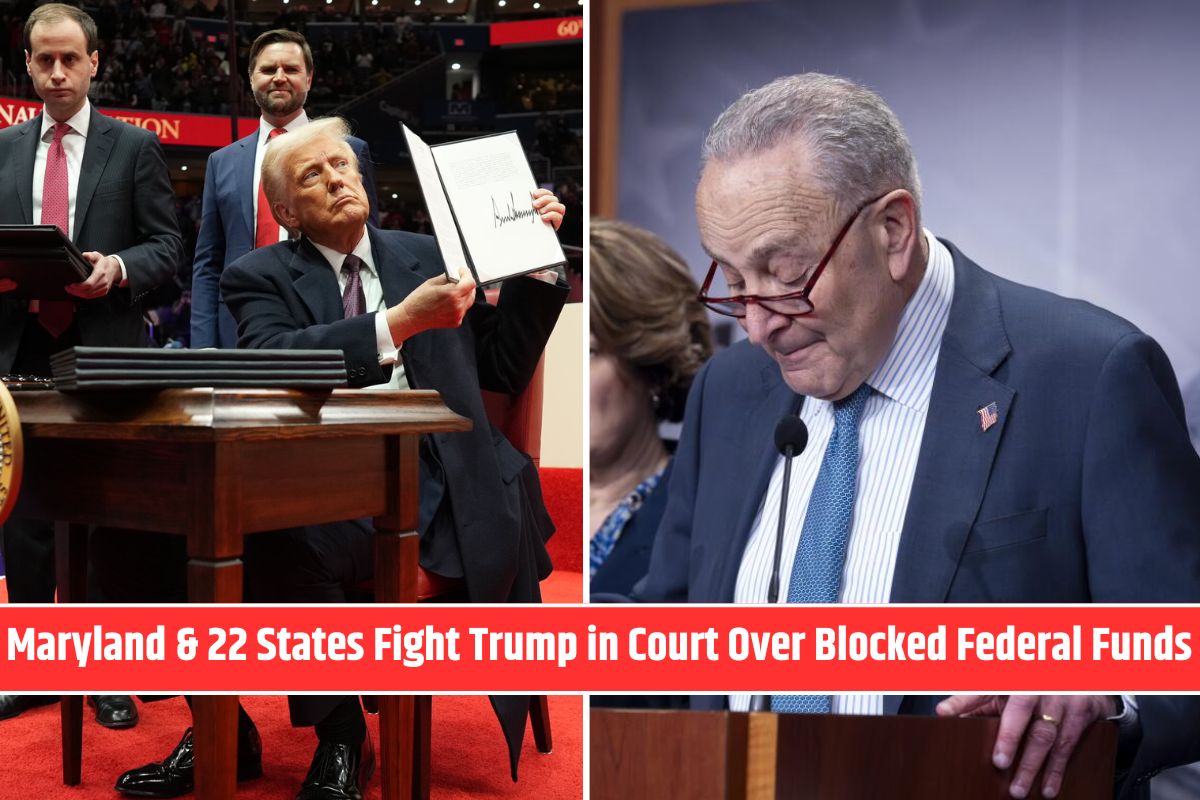Maryland has joined 22 other states in a lawsuit challenging the Trump administration’s federal funding freeze, which was set to take effect on Tuesday at 5 p.m. but was temporarily blocked by a federal judge. The move has sparked concerns among state leaders, nonprofits, and residents, as the freeze could impact Medicaid, education, law enforcement, and social services.
Federal Judge Temporarily Blocks Funding Freeze
Judge Loren L. AliKhan of the U.S. District Court for the District of Columbia ruled to pause enforcement of the White House directive while considering legal arguments from both the U.S. government and the plaintiffs, which include state governments and advocacy groups.
Key Rulings:
- The funding freeze is paused until at least Monday at 5 p.m. to allow further legal review.
- The freeze could impact billions in federal aid that supports essential state programs.
- Maryland Attorney General Anthony Brown warned that the freeze would be unconstitutional and devastating for residents.
How Would the Funding Freeze Affect Maryland?
1. Medicaid and Healthcare Disruptions
- On Tuesday, Maryland was locked out of the federal Medicaid payment system, delaying reimbursements for patients and providers.
- Maryland Health Secretary Laura Herrera Scott reported that state employees received an error message when trying to access funds, which were only partially restored by late afternoon.
2. Impact on Social Services
- The freeze could disrupt funding for early childhood education, healthcare programs, and housing assistance.
- Head Start, which serves low-income children, could see major disruptions in Maryland.
- Meals on Wheels warned that vulnerable seniors could lose access to meal deliveries.
3. Law Enforcement and Public Safety
- Maryland’s law enforcement agencies rely on federal grants for crime prevention and victim protection programs.
- Attorney General Brown warned that losing these funds could jeopardize public safety across the state.
4. Infrastructure and Economic Growth
Maryland has received billions in federal aid for major infrastructure projects, including:
- $85 million to redevelop the Highway to Nowhere in West Baltimore.
- $7 million to improve security at places of worship across the state.
- $2 billion to rebuild the Francis Scott Key Bridge, which collapsed in early 2024.
Gov. Wes Moore criticized the funding freeze, stating:
“This could cost jobs, raise prices, and stifle economic growth in Maryland. These resources are meant for our schools, hospitals, first responders, and seniors.”
Legal and Political Backlash
1. Maryland’s Lawsuit Against the Trump Administration
- Maryland is part of a 23-state coalition suing the federal government, arguing the freeze violates the Impoundment Control Act of 1974.
- Democratic lawmakers claim the move is unconstitutional, as the funds were already approved by Congress.
2. Congressional Response
- Senate Minority Leader Chuck Schumer called the freeze “lawless, dangerous, and cruel.”
- Sen. Patty Murray urged Republicans to block Trump’s OMB nominee, Russ Vought, until the freeze is lifted.
- Sen. Lindsey Graham questioned the end goal of the freeze and its impact on communities.
3. Possible Supreme Court Involvement
- If lower courts rule against the Trump administration, the Justice Department could appeal to the Supreme Court.
- A final ruling could determine whether the White House can withhold funds approved by Congress.
What Happens Next?
- The court’s temporary pause on the funding freeze remains in effect until at least Monday.
- Maryland and other states will continue their legal fight to permanently block the freeze.
- The White House may issue clarifications or modify the directive to avoid further legal challenges.
For now, Maryland’s social programs, infrastructure projects, and public safety funding remain uncertain, with millions of residents at risk of losing essential services.
Maryland’s lawsuit reflects widespread concern over the Trump administration’s funding freeze, which could disrupt healthcare, education, and law enforcement services. While the federal court’s temporary stay provides relief for now, the legal battle is far from over. If the funding freeze is ultimately upheld, Maryland and other states could face severe economic and social consequences.
With billions in federal aid at stake, the coming weeks will determine whether the White House’s funding freeze stands or is struck down in court.
